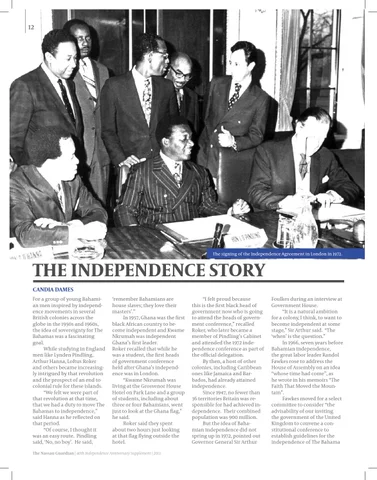The Road to Independence: The Bahamas and Its American Connection
- Dontae Gilbert
- Mar 18
- 3 min read
Updated: Apr 23
On July 10, 1973, the Bahamas officially gained independence from the United Kingdom, marking the beginning of a new era for the island nation. This historic event not only ended over 250 years of British colonial rule but also reshaped the country's relationship with global powers—particularly the United States. While independence brought new opportunities and challenges for the Bahamas, the American connection played a crucial role in the nation’s economic, political, and security landscape.
The Path to Independence: Rising Nationalism and Political Change
The movement toward Bahamian independence gained momentum in the mid-20th century as a growing nationalist sentiment took hold. The Progressive Liberal Party (PLP), led by Lynden Pindling, emerged as the leading voice for self-governance, advocating for economic and social reforms that would benefit the majority Black population, who had long been marginalized under British rule. By 1967, the PLP won control of the government, and the push for independence became unstoppable. After negotiations with Britain, independence was formally granted on July 10, 1973.
The Immediate Impact: U.S. Recognition and Diplomatic Relations
The United States swiftly recognized the Bahamas as a sovereign nation, maintaining strong diplomatic ties. The U.S. established an embassy in Nassau and continued to support the Bahamas in its transition to independence. Despite the shift from a colonial relationship to one of sovereign equals, the U.S. remained a dominant economic and political influence in the region.
Economic Ties: Trade, Tourism, and Financial Services
One of the most significant aspects of the U.S.-Bahamas relationship post-independence was economic cooperation. The U.S. remained the Bahamas' largest trading partner, with American tourists and investors playing a pivotal role in the nation’s economy.
Tourism Boom: With its proximity to Florida, the Bahamas became a top destination for American travelers. Tourism, largely fueled by U.S. visitors, quickly became the backbone of the Bahamian economy, contributing significantly to employment and GDP.
Financial Sector Expansion: The Bahamas also developed a reputation as an offshore banking hub, attracting American and international businesses seeking tax advantages and asset protection.
Trade Partnerships: The U.S. continued to supply the Bahamas with essential imports, including food, manufactured goods, and fuel, while the Bahamas exported seafood and other products to American markets.
Security and Law Enforcement Cooperation
As the Bahamas transitioned into independence, security and law enforcement cooperation with the U.S. became increasingly important. The nation’s geographic position—just 50 miles from Florida—made it a strategic location in the fight against drug trafficking and illegal migration.
The Drug Trade Challenge: By the 1980s, the Bahamas had become a major transit point for drug cartels smuggling cocaine from South America into the United States. In response, the U.S. launched joint operations with Bahamian authorities to curb drug trafficking. The two nations signed agreements to increase law enforcement collaboration, leading to increased U.S. assistance in training and equipping Bahamian security forces.
Border Security & Immigration: The Bahamas also became a crucial partner in addressing illegal migration, with many undocumented individuals using the islands as a stepping stone to enter the United States. Cooperation between Bahamian and American border agencies intensified to tackle this issue.
The Challenges of Sovereignty: Economic Struggles and Political Shifts
While independence allowed the Bahamas to control its political and economic destiny, challenges soon arose.
Economic Dependency: Despite efforts to diversify the economy, the Bahamas remained heavily reliant on American tourism and investment. Global economic downturns, including the 2008 financial crisis, had significant effects on the nation’s financial stability.
Crime and Corruption Concerns: The rapid expansion of the offshore banking sector raised concerns about money laundering and financial transparency, leading to increased scrutiny from U.S. regulatory bodies.
Political Transitions: Over the decades, different administrations in the Bahamas pursued varying degrees of engagement with the United States, sometimes leading to policy shifts in trade, taxation, and law enforcement cooperation.
A Lasting Bond: The U.S.-Bahamas Relationship Today
Fifty years after independence, the relationship between the Bahamas and the United States remains strong. The two nations continue to work together on economic development, security, environmental sustainability, and disaster response. American cultural influence is evident in Bahamian
media, education, and business, while Bahamians maintain deep familial and economic ties with the U.S.









Comments